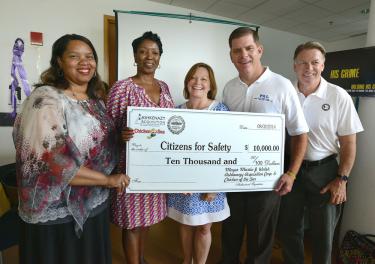August 7, 2014
 LIPSTICK: Mayor Martin Walsh joined LIPSTICK for a workshop and meeting at the Grove Hall Library on Saturday. From left to right: Kim Odom, Ruth Rollins, Kristen Keif, Mayor Martin Walsh and Paul Barrett. Mayor’s Office Photo by Isabel Leon
LIPSTICK: Mayor Martin Walsh joined LIPSTICK for a workshop and meeting at the Grove Hall Library on Saturday. From left to right: Kim Odom, Ruth Rollins, Kristen Keif, Mayor Martin Walsh and Paul Barrett. Mayor’s Office Photo by Isabel Leon
An overflow audience, including Mayor Martin Walsh, packed an anti-violence meeting in Grove Hall last Saturday held by Ladies Involved in Putting a Stop to Inner City Killing, or LIPSTICK, a project of Citizens for Safety, an umbrella group working to stem illegal gun trafficking nationwide.
The organization specifically targets the role of women in the illicit trade of firearms.
According to LIPSTICK co-founder Ruth Rollins, women frequently enable gun violence in their neighborhoods by buying, holding, or hiding guns for the men in their lives. And women commonly act as straw buyers, purchasing guns for individuals who are unable to pass criminal background checks – the so-called iron pipeline.
“They don’t realize the consequences,” said Rollins. Caught with an illegal gun, a man with a felony record might face a long prison sentence whereas a young woman with a clean record might receive 18 months in the House of Correction. “She may reason that she can easily do 18 months for her man,” said Rollins. “But while she is sitting in the House of Correction, he will just move on to someone else.”
LIPSTICK’s public service ad campaign, “His Crime, Your Time,” began appearing on MBTA buses and subway cars in April.
Rollins founded the organization with Kim Odom, whose son Steven, 13, was gunned down near his Dorchester home in 2007. Rollins’s son, Warren Daniel Hairston, 21, was also murdered that year. Both mothers had been searching for a way to help prevent the same thing from happening to other children. In 2009, they attended a workshop sponsored by Citizens for Safety on the question: Where did that gun come from?
“It was my aha! moment,” said Odom. “The boy who killed Steven was only 16 years old.” The suspect in the murder of Rollins’s son was also 17 at the time. Odom realized that neither youthful killer could have obtained a firearm if an illegal weapon had not been so easily available.
“After a shooting, people ask who the shooter was, why he did it, but we also need to ask where the gun came from,” said Odom. LIPSTICK aims to trace the path from gun dealer, through straw buyer, to shooter and to victim. “We take a public health viewpoint,” said Odom. She also discusses the moral dimension. “Do you want to be the person who bought a gun that killed a child in your neighborhood?” she asks.
But women are often coerced into providing guns, says Rollins, who is a domestic violence advocate in her day job. “They can be in real danger if they refuse,” she said.
LIPSTICK’s intimate sessions provide a safe space to talk about such predicaments, according to Dorchester resident Judy E. Rose, who attends the monthly training. “People often share experiences with guns and solutions they have discovered that give me ideas I can take back to the community,” said Rose.
In its two-year history, LIPSTICK has sent well over 100 activists into the community, Rollins estimates. And as the consciousness of the community is raised, women are getting pressure – and support – to stop being involved with guns.
According to Walsh, the gains are incremental, but real. “This year alone, we’ve taken 757 guns off the street,” he said. A Boston Police-led gun buy-back program has contributed, but LIPSTICK has also been an important piece of that, Walsh said. But while shootings are down 30 percent, homicides have increased. “We have to do more,” said Walsh.
Recently he was concerned when he learned that LIPSTICK needed funding. Because city funds were not available, he asked his friend Paul Barrett to find a private donor. At the meeting, Walsh presented a check for $10,000 from Ashkenazi Acquisition Corp., which manages Faneuil Hall Marketplace, and Chicken of the Sea.
Next Monday, LIPSTICK will hold its annual Beauty Event at Princey’s Hair Salon on Washington Street in Codman Square. Coupons, giveaways, music and food will be provided, along with practical steps women can take to stop the shootings.
“We work with people where they are,” said Rollins. “There are things you can do every day.”
Villages:
Topics:



